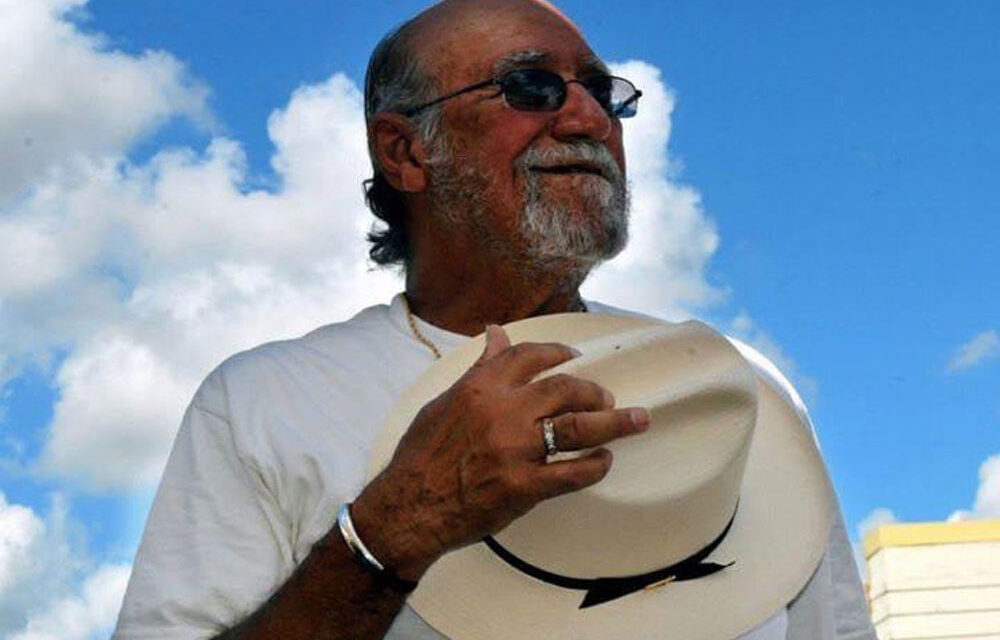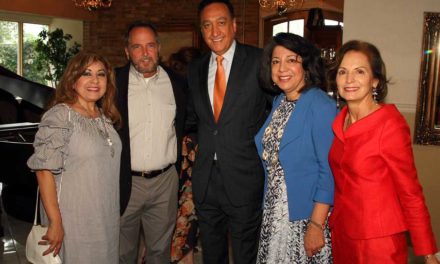Lopez was born on April 13, 1940, in San Antonio, the youngest child of Santiago Lopez and Evangelina Valdéz Lopez. He attended St. John Berchmans Catholic School, Central Catholic High School, and Edgewood High School before enlisting in the United States Air Force.
In the Air Force, he met Ramón de León, who would become one of his closest camaradas, The two would be in each other’s lives for nearly 60 years, bearing witness as each celebrated life’s milestones like parenthood, college degrees, and retirement.
After an honorable discharge, Lopez embarked on a civil service career at Kelly Air Force Base from which he would retire at age 50.
Weeks after his retirement, he could be found strumming a bajo sexto, the 12-string bass guitar of traditional conjunto music. He began taking lessons at the Guadalupe Cultural Arts Center (GCAC) from conjunto maestros Valerio Longoria, Sandy Sanchez, and Toby Torres.
He completed the Texas Folklife Resources’ Apprenticeship Program in 1995, and, along with accordionist/artist Nicolás Valdéz, began teaching conjunto music at Seguin’s Teatro de Artes de Juán Seguín in 1997.
When the students had completed the GCAC’s music program, Rudy and his fellow classmates continued meeting on their own to keep practicing.
“Rudy and I discovered we both had ideas about honoring conjunto music, and its musicians, to help make sure the music was preserved for future generations,” says Carol Rodriguez, one of Lopez’s conjunto music classmates who studied accordion.
“Because we were learning by practice and teaching each other,” Rodriguez says, “we started brainstorming about forming an organization that formalized teaching these traditional instruments to more students, particularly the youth, to continue the traditional music.”
In 2002, Lopez, Rodriguez and Fernando Villegas started the Conjunto Heritage Taller (CHT), the organization through which the trio would preserve this South Texas musical style. The Taller’s faculty has included conjunto music pioneers like Santiago Jimenez, Chucho Perales, and Bene Medina. Today, the CHT is in its twenty-first year, enrolling around 100 students.
“Rudy’s idea was to have the students learn a song and then perform in the community,” explains Rodriguez. “This motivated them to continue learning, and was key in growing our students and getting to know the community.”
Taller students have performed throughout the city, providing an authentic San Antonio soundtrack at venues like the Institute of Texas Cultures, the Tejano Conjunto Festival, the International Accordion Festival, La Villita, and Lopez’s annual Easter Bash at his Ranchito Rosal on the city’s southern outskirts.
An avid traveler, Lopez frequently took his bajo sexto to destinations in México, Europe, India, and South America, sharing the sound of South Texas to the rest of the world.
While music and performance were integral in Lopez’s life, his priorities were his wife of 58 years, Elvira, his two daughters, Monica and Letty, and his grandchildren, Andrew Cash, Matthew Wyatt, and Eva Giselle.
In addition to family and music, Lopez’s interests included ranching, photography, beekeeping, and organic gardening.
Thoughts from his niece, Elena Favela, Ph.D, on the passing of her Uncle Rudy Lopez
Many people, not just his nieces and nephews, called him Uncle Rudy. For so many, he was indeed like an uncle, and so much more.
He walked me through his greenhouse, and held aromatic plants to my nose. He was so proud of the chile pequín he grew and picked and that Aunt Vera made salsa out of that left my mouth burning for hours. I learned to just not eat it anymore. He played the bajo and we sang Wille Nelson, La Zandunga, and always Paloma Negra.
At the rancho I learned about the many projects he had going on. When he first acquired the land, I was six years old. There were wild pigs running the land. My brother took his go cart out there and we zoomed around, dodging the charged up pigs.
To my mother’s chagrin, Uncle Rudy let me shoot a burnt tortilla with his BB gun when I was about 8.
The Easter Bash was the best and most festive, and Easter was easily my favorite holiday because of the bash. Families came together: Lopez, Favela, Saldaña, and over time, the family grew. I’m not sure how else I would have gotten to know my extended family had it not been for these parties.
Uncle Rudy brought people together and was so generous with the best of what he had. I took my niece, Adelina, to ride on his ponies at the ranch. He invited kids from city schools to Rancho ROSAL to ride ponies, learn about growing food, and walk the paths on his beautiful rancho. Over the years I helped him move many a haystack. He showed me his compost worms and we talked at length about the rich dirt they produced. He gave my mom jars of honey from the bees he raised, and made sure she knew it was the best honey available, and that she should never again buy honey from the store.
Uncle Rudy and I became closer in the last 10 years of his life. I would call him on the phone and his excitement was apparent in the way he said the name he had for me, “Elenoocher!” It came with so much love and endless joy.
We talked about politics, we philosophized, and discussed aging, family, and music. Like so many others, he made me feel like I was the most important person in the world. His presence was all I could feel during our moments of connection.
Uncle Rudy was captivating, and my memories of him will continue to be. He loved so much and so deeply. His passion for all things in life came through his eyes that always seemed to be smiling, even during tough times.
It’s hard to believe that I’ll never again hear his enthusiasm for hearing my voice on the phone, or that we may never experience an Easter Bash in the same way again. I know that I will always feel his presence in the comunidad, in the energy he has left in many places of San Antonio, and in the joy and beauty he has left in each of us.
IN MEMORIAM: Rodolfo S. Lopez The San Antonio arts community mourns the loss of Rodolfo Santiago Lopez, 83










